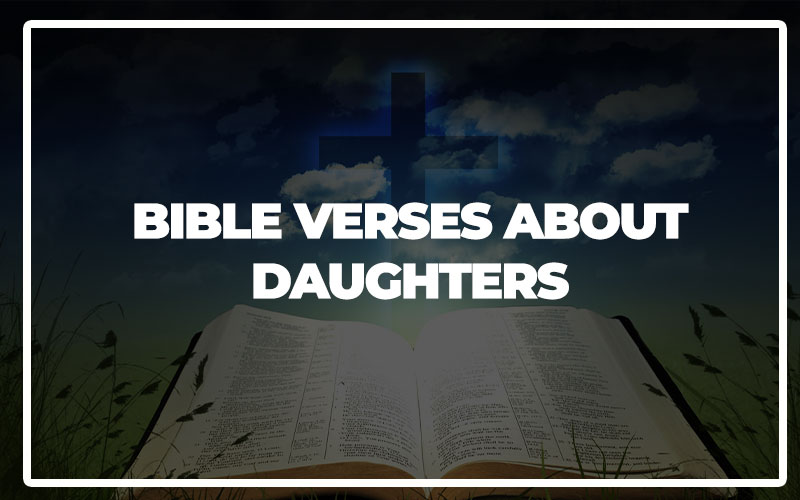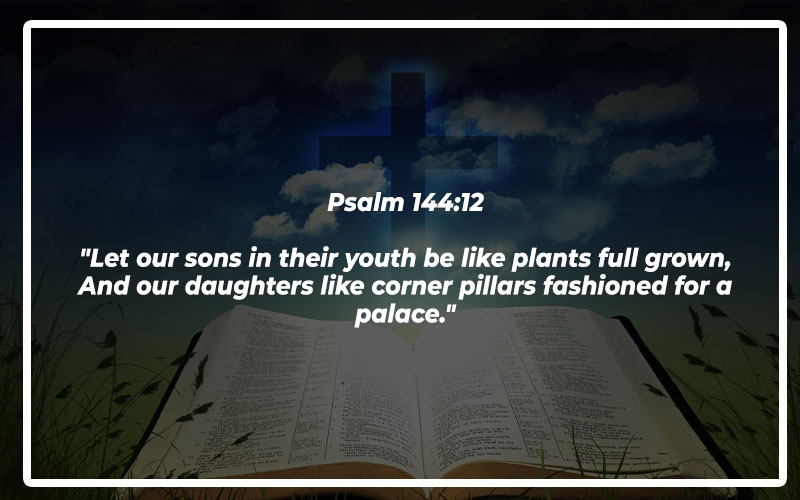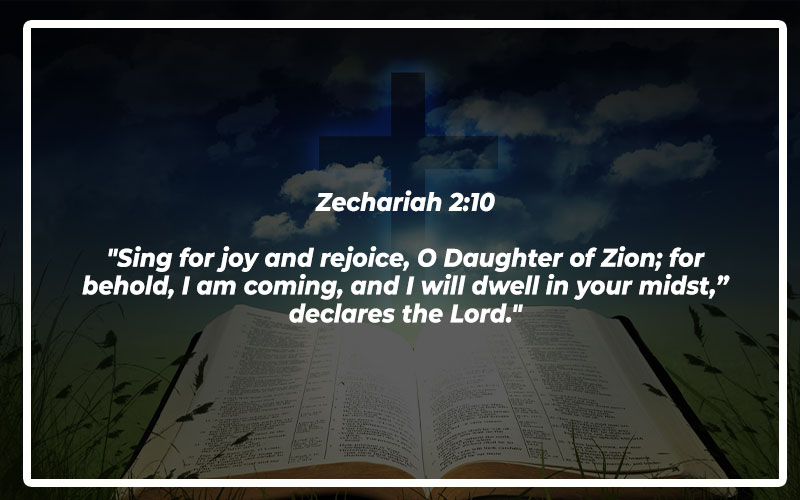Are you looking to know the top Bible verses about daughters? If yes, then you are in the right place.
The Bible is full of wisdom and guidance for all aspects of life, including the special relationship between parents and their daughters.
In its pages, we find verses that highlight the value, love, and importance of daughters in a family.
These verses not only provide comfort and encouragement but also remind us of the cherished place daughters hold in the eyes of God.
Let’s explore some of these beautiful passages that celebrate and honor daughters.
Also Read: Bible Verses About Sisterly Love
Bible Verses About Daughters
Psalm 144:12
“Let our sons in their youth be like plants full grown, And our daughters like corner pillars fashioned for a palace.”
The verse highlights the beauty and strength of daughters, likening them to well-crafted pillars that add stability and elegance to a palace. This metaphor emphasizes the important role daughters play in the family and society, contributing to its strength and grace.
Proverbs 31:30
“Charm and grace are deceptive, and [superficial] beauty is vain, But a woman who fears the Lord [reverently worshiping, obeying, serving, and trusting Him with awe-filled respect], she shall be praised.”
This verse underscores the value of a daughter’s character over her physical appearance. It praises the virtues of a God-fearing woman, highlighting that her true worth lies in her reverence for the Lord.
Proverbs 23:24-25
“The father of the righteous will greatly rejoice, And he who sires a wise child will have joy in him. Let your father and your mother be glad, And let her who gave birth to you rejoice [in your wise and godly choices].”
These verses celebrate the joy and pride parents feel for a righteous and wise daughter. It emphasizes the blessings and happiness that come from raising children who make godly choices.
Ezekiel 16:44
“Behold, everyone who uses proverbs will use this proverb against you: ‘Like mother, like daughter.’”
This proverb points to the influence mothers have on their daughters, suggesting that daughters often reflect the behaviors and characteristics of their mothers. It highlights the generational transmission of values and traits.
Mark 5:34
“Then He said to her, ‘Daughter, your faith [your personal trust and confidence in Me] has restored you to health; go in peace and be permanently healed from your suffering.'”
Jesus’ address to the woman as “Daughter” emphasizes His compassion and the intimate relationship He offers to those who believe in Him. It underscores the power of faith in bringing about healing and peace.
Luke 8:48
“He said to her, ‘Daughter, your faith (your personal trust and confidence in Me) has made you well. Go in peace (untroubled, undisturbed well-being).'”
Similar to Mark 5:34, this verse reiterates Jesus’ gentle and loving acknowledgment of the woman’s faith. Calling her “Daughter” signifies her inclusion in God’s family and the peace that comes from faith.
2 Corinthians 6:18
“And I will be a Father to you, And you will be My sons and daughters,” Says the Lord Almighty.
This promise from God assures believers of their place in His family. Being called sons and daughters of the Almighty highlights the intimate and loving relationship God desires to have with His people.
Genesis 31:50
“If you afflict, humiliate, or take [other] wives besides my daughters, although no man is with us [as a witness], see and remember, God is witness between you and me.”
Laban’s warning to Jacob concerning his daughters underscores the protection and care expected for daughters. It highlights the importance of treating them with respect and fairness, knowing that God is always watching.
Zechariah 9:9
“Rejoice greatly, O Daughter of Zion! Shout aloud, O daughter of Jerusalem! Behold, your King [Messiah] is coming to you; He is righteous and endowed with salvation, Humble and unassuming [in submission to the will of the Father] and riding on a donkey, Upon a colt, the foal of a donkey.”
This prophetic verse calls for the daughters of Zion and Jerusalem to rejoice at the coming of the Messiah. It emphasizes the hope and joy that the arrival of Jesus brings to God’s people.
Matthew 9:22
“But Jesus turning and seeing her said, ‘Take courage, daughter; your [personal trust and confident] faith [in Me] has made you well.’ And at once the woman was [completely] healed.”
Jesus’ tender address to the woman as “daughter” highlights His compassion and the personal care He extends to those who have faith in Him. It also emphasizes the power of faith in bringing about miraculous healing.
Isaiah 62:11
“Listen carefully, the Lord has proclaimed to the end of the earth, Say to the Daughter of Zion, ‘Look now, your salvation is coming [in the Lord]; Indeed, His reward is with Him, and His restitution accompanies Him.’”
This verse proclaims the coming of salvation to the Daughter of Zion, symbolizing the people of Israel. It highlights the hope and deliverance that God brings, emphasizing His faithfulness and reward.
Micah 4:8
“As for you [Jerusalem], tower of the flock of Israel, Hill and stronghold of the Daughter of Zion [Jerusalem’s people], To you the former dominion shall come, The kingdom of the Daughter of Jerusalem [when the Messiah reigns in Jerusalem and the times of the Gentiles are fulfilled].”
This verse speaks of the restoration of Jerusalem and the return of its former glory. It highlights the significance of the Daughter of Zion and the promise of the Messiah’s reign.
Judges 11:34
“Then Jephthah came to his house at Mizpah; and behold, his daughter was coming out to meet him with tambourines and with dancing. Now she was his one and only child; besides her he had no son or daughter.”
This verse describes the joyful welcome of Jephthah’s daughter. It highlights her importance and uniqueness as his only child, underscoring the bond between fathers and daughters.
Also Read: Bible Verses About Esther
Job 42:15
“In all the land there were found no women so fair as the daughters of Job; and their father gave them inheritance among their brothers.”
This verse emphasizes the beauty and value of Job’s daughters, noting their uniqueness in the land. It also highlights the progressive act of giving them an inheritance, illustrating their equal worth.
Psalm 45:13
“The King’s daughter is all glorious within [the palace]; Her clothing is interwoven with gold.”
This verse celebrates the splendor and beauty of the King’s daughter, symbolizing her royal status and inner glory. It emphasizes her worth and the honor bestowed upon her.
Genesis 34:1
“Now Dinah [the daughter] of Leah, whom she had borne to Jacob, went out [unescorted] to visit the girls of the land.”
This verse introduces Dinah, emphasizing her identity as Leah’s daughter and Jacob’s child. It sets the stage for the events that follow, highlighting her independent action.
Genesis 21:33
“Then Abraham planted a tamarisk tree at Beersheba, and there he called on the name of the Lord [in prayer], the Eternal God.”
This verse is part of the broader narrative where Abraham interacts with his descendants, including his daughters-in-law. It emphasizes the importance of calling on the Lord and establishing a place of worship.
Zephaniah 3:14
“Shout for joy, O Daughter of Zion! Shout [in triumph], O Israel! Rejoice, be in high spirits and glory with all your heart, O Daughter of Jerusalem [in that day]!”
This verse calls for the Daughter of Zion and Jerusalem to rejoice, celebrating the victory and salvation brought by the Lord. It emphasizes the collective joy and high spirits of God’s people.
Jeremiah 31:22
“How long will you hesitate [to return], O you faithless and renegade daughter? For the Lord has created a new thing in the land [of Israel]: A woman will encompass (tenderly love) a man.”
This verse addresses the faithless daughter of Israel, calling for her return. It highlights the new thing God is creating, emphasizing restoration and renewed relationships.
1 Kings 3:1
“Now Solomon became a son-in-law to Pharaoh king of Egypt [and formed an alliance] by taking Pharaoh’s daughter [in marriage]. He brought her to the City of David [where she remained temporarily] until he had finished building his own house (palace) and the house of the Lord and the wall around Jerusalem.”
This verse describes Solomon’s marriage to Pharaoh’s daughter, highlighting the political alliance and the significant role daughters play in forming such alliances. It underscores the strategic importance of daughters in royal and political contexts.
Proverbs 4:3
“When I was a son with my father (David), Tender and the only son in the sight of my mother (Bathsheba).”
This verse highlights the tender relationship between a parent and child, emphasizing the unique and cherished position of being the only child in a parent’s sight. It speaks to the deep love and care parents have for their children.
Genesis 24:60
“They blessed Rebekah and said to her, ‘May you, our sister, Become [the mother of] thousands of ten thousands, And may your descendants possess (conquer) The [city] gate of those who hate them.'”
This verse shows the blessings given to Rebekah, emphasizing the hopes and prayers for her future as a daughter and sister. It highlights the significance of blessings and well-wishes from family members.
Matthew 10:35
“For I have come to set a man against his father, and a daughter against her mother, and a daughter-in-law against her mother-in-law;”
This verse speaks of the division that can occur even within families due to differing beliefs and values. It emphasizes the challenging dynamics that can arise in close relationships, including those between daughters and their parents.
Genesis 31:55
“Early in the morning Laban got up and kissed his grandchildren and his daughters and pronounced a blessing [asking God’s favor] on them. Then Laban left and returned home.”
This verse illustrates the loving farewell and blessings given by Laban to his daughters and grandchildren. It underscores the importance of familial blessings and affectionate goodbyes.
Judges 21:21
“And watch; if the daughters of Shiloh come out to dance in the dances, then come out of the vineyards, and each of you shall catch his wife from the daughters of Shiloh and go to the land of Benjamin.”
This verse describes a specific event involving the daughters of Shiloh. It highlights cultural practices and the significance of daughters within the community context.
Ruth 2:2
“And Ruth the Moabitess said to Naomi, ‘Please let me go to the field and glean among the ears of grain after one [of the reapers] in whose sight I may find favor.’ Naomi said to her, ‘Go, my daughter.'”
This verse shows Ruth’s respect and initiative in seeking provision for herself and Naomi. Naomi’s affectionate response underscores the mother-daughter-like bond they share.
Song of Solomon 1:5
“I am deeply tanned but lovely, O daughters of Jerusalem, [pleased] like the tents of Kedar, Like the curtains of Solomon.”
This verse features a self-description by the speaker, addressing the daughters of Jerusalem. It highlights themes of beauty and self-awareness within the context of community identity.
Lamentations 4:3
“Even the jackals offer the breast, They nurse their young; But the daughter of my people has become cruel Like ostriches in the wilderness [that desert their young].”
This verse laments the cruelty and harshness that has overtaken the daughter of the speaker’s people, contrasting it with the nurturing nature of even wild animals. It highlights the profound sense of loss and desolation.
Ezekiel 16:45
“You are your mother’s daughter who loathes her husband and her children; you are the sister of your sisters who loathed their husbands and their children. Your mother was a Hittite and your father an Amorite.”
This verse addresses the behavior and lineage of the addressed person, emphasizing familial and generational traits. It highlights the influence of family background on individual behavior.
1 Samuel 18:20
“Now Michal, Saul’s daughter, loved David; and when they told Saul, it pleased him.”
This verse describes Michal’s love for David and her father Saul’s reaction. It underscores the dynamics of love and approval within the family, highlighting the relationships between father, daughter, and potential son-in-law.
Leviticus 21:9
“If the daughter of any priest profanes herself by playing the prostitute, she profanes her father; she shall be burned with fire.”
This verse emphasizes the serious consequences of a priest’s daughter engaging in immoral behavior, highlighting the impact of her actions on her father’s honor and reputation.
Zechariah 2:10
“Sing for joy and rejoice, O Daughter of Zion; for behold, I am coming, and I will dwell in your midst,” declares the Lord.”
This verse calls for the Daughter of Zion to rejoice, celebrating the Lord’s promise to dwell among His people. It highlights the joy and hope that comes with God’s presence.
Jeremiah 6:2
“I have compared the Daughter of Zion To a lovely and delicate woman [to be taken care of].”
This verse uses a metaphor to describe the Daughter of Zion, emphasizing her beauty and delicateness. It underscores the need for care and protection for God’s people.
Mark 7:29
“And He said to her, ‘Because of this answer [reflecting your humility and faith], go; [knowing that] the demon has left your daughter [permanently].'”
This verse recounts Jesus’ response to a woman’s faith, resulting in the healing of her daughter. It highlights the power of faith and humility in bringing about miraculous outcomes.
Numbers 27:7
“The daughters of Zelophehad are right in their statements. You shall certainly give them a possession of an inheritance among their father’s brothers, and you shall transfer their father’s inheritance to them.”
This verse recognizes the rightful claim of Zelophehad’s daughters to their father’s inheritance, emphasizing justice and fairness in the distribution of property. It highlights the importance of acknowledging and addressing the rights of daughters.
Also Read: Bible Verses About Good Wife
What Does the Bible Say About Daughters
Throughout both the Old and New Testaments, daughters are depicted in various lights, reflecting cultural norms, familial relationships, and divine purposes.
In the Old Testament, daughters often appear in genealogies, signifying their importance within family lineage. For instance, the daughters of Zelophehad (Numbers 27) boldly approached Moses to claim their inheritance, highlighting issues of property rights and women’s roles in ancient Israel. Their story underscores the principle of justice and God’s care for equitable treatment.
Several prominent daughters in the Bible demonstrate virtues such as loyalty, faith, and courage. Ruth, though not initially an Israelite, becomes a revered daughter-in-law to Naomi, exemplifying dedication and faithfulness (Ruth 1-4). Esther, an orphan raised by her cousin Mordecai, becomes a queen and plays a pivotal role in saving her people from destruction (Esther 1-10).
In the New Testament, daughters also hold significant positions. Jesus’ interactions with women, including daughters, reveal his compassionate and inclusive ministry. The healing of Jairus’ daughter (Mark 5:21-43) is a powerful testament to Jesus’ authority over life and death and his concern for familial bonds. Additionally, the parable of the prodigal son (Luke 15:11-32) implicitly references daughters by challenging societal norms and emphasizing God’s inclusive love and forgiveness.
Furthermore, the Bible encourages treating daughters with love and respect. Fathers are admonished to raise their children, including daughters, in the discipline and instruction of the Lord (Ephesians 6:4). Proverbs 31 praises the virtuous woman, likely a mother and daughter, for her strength, wisdom, and noble character.
In summary, the Bible portrays daughters as integral members of their families and communities, endowed with dignity, worth, and purpose. Their stories and roles illustrate broader spiritual truths and divine principles, emphasizing justice, faithfulness, compassion, and God’s inclusive love.



